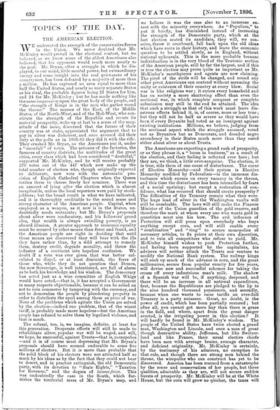TOPICS OF THE DAY.
THE AMERICAN ELECTION.
WE underrated the strength of the conservative forces in the Union. We never doubted that Mr. McKinley would prevail in the electoral contest, but we believed, as we know some of the ablest Americans also believed, that his opponent would reach more nearly to the goal. Mr. Bryan, after a struggle in which he dis- played, to our mind, little mental power, but extraordinary energy and some insight into the real grievances of his countrymen, has been defeated by a majority of more than a million. He has captured an area equal to more than half the United States, and nearly as many separate States as his rival, the probable figures being 21 States for him, and 24 for Mr. McKinley ; but he has made nothing like the same impression upon the great body of the people, and "the strength of Kings is in the men who gather round the throne." The masses of the East, of the Middle States, of the North-West, and of the Mid-West, who con- stitute the strength of the Republic and secure its material prosperity, woke up at last to a sense of the mag- nitude of the issue, discerned that the future of their country was at stake, appreciated the argument that to pay in silver was dishonest, and once aroused did their duty at the polls as in 1861-05 they did it with the rifle. They crushed Mr. Bryan, as the Americans put it, under a " snowfall " of votes. The artisans of the factories, the farmers of country districts, the multitudes of the great cities, every class which had been considered "doubtful," supported Mr. McKinley, and he will receive probably 270 votes out of the 447 which now make up the total number of electors who, though originally expected to deliberate, now vote with the automatic pre- cision of English Cathedral Chapters when the Queen invites them to choose freely her nominee. There was an amount of lying after the election which is almost inexplicable, unless the local reporters were paid by stock- jobbers ; but the broad result is what we have indicated, and it is thoroughly creditable to the sound sense and strong character of the American people. Capital, when employed as a weapon, as it now is in the States, un- doubtedly needs restraints ; but Mr. Bryan's proposals about silver were confiscatory, and his followers' grand idea, that wealth is always swindling poverty, is an absurd illusion. A greater approach to economic equality must be secured by other means than force and fraud, and the American people are right in deciding that until those means are discovered they will bear with the ills they have rather than, by a wild attempt to remedy them, destroy credit, degrade morality, and throw the industry of a continent into hopeless confusion. We doubt if a vote was ever given that was better cal- culated to dispel, or at least diminish, the fears of those who, while they do not question that Demos, the new Sovereign, is well intentioned, are full of alarm as to both his knowledge and his wisdom. The democracy has acted just as a wise committee of English Whigs would have acted,—that is, it has accepted a Government in many respects objectionable, because it can be relied on not to ruin commerce by tampering with the currency, and not to demoralise the people by plundering property in order to distribute the spoil among them as prize of war. None of the problems which agitate the Union are solved by the election—indeed one problem, that of the wisest tariff, is probably made more hopeless—but the American people has refused to solve them by legalised violence, and that is much.
The refusal, too, is, we imagine, definite, at least for this generation. Desperate efforts will still be made to rehabilitate silver, popular war will be waged, and will, we hope, be successful, against Trusts—that is, monopolies —and it is of course most depressing that Mr. Bryan's proposals should have seemed endurable to some five millions of electors. But it is more than probable that the solid block of his electors were not attracted half so much by his ideas as by the fact that they could not bear to desert, and in practice extinguish, the old Democratic party, with its devotion to "State Rights," "Taxation for Revenue," and the dogma of laissez-faire. This was undoubtedly the case in the South, which fur- nishes the territorial mass of Mr. Bryan's map, and we believe it was the case also to an immense ex- tent with the minority everywhere. As "Populism," to- put it briefly, has diminished instead of increasing the strength of the Democratic party, which at the last election seated its candidate, they will, we con- ceive, throw it overboard, fall back upon the old ideas which have roots in their history, and leave the economic question to be settled slowly, as in England, without national upheavals. This is the more probable because individualism is in the very blood of the Teutonic section of the American people, still by far the largest, and if this is true the election may prove quite as important as Mr. McKinley's mouthpieces and agents are now claiming. The pivot of the strife will be changed, and round any other pivot Americans can contend without menacing the unity or existence of their country at every blow. Social war is like religious war ; it enters every household and has on society a more shattering effect than even the sectional war, in which complete conquest or complete submission may still in the end be attained. The idea that such a struggle as that of this week must leave dis- astrous effects behind it, is, of course, more or less true ; but they will not be half as severe as they would have been if every Bryanite had voted as an insurgent against existing institutions. Millions, we believe, judging from the sectional aspect which the struggle assumed, voted not as Bryanites but as Democrats, and dreaded negro ascendency in their States much more than they cared either about silver or about Trusts.
The Americans are expecting a grand rush of prosperity, or as they phrase it, a "boom in business," as a result of the election, and their feeling is reflected over here ; but they are, we think, a little over-sanguine. The election, it is true, rids them of one cause of disturbance. The curse of Elective Monarchy—and their system is Elective Monarchy modified by Federalism—is the immense dis- turbance which ensues on every vacancy in the throne, and this time the disturbance has been intensified by fears of a social uprising; but except a restoration of con- fidence, what has occurred that should create prosperity ? The difficulties of the Treasury remain what they were. The huge load of silver in the Washington vaults will still be unsaleable. The laws will still make the Finance Minister of the Union guardian of the gold reserve, and therefore the mark at whom every one who wants gold in quantities must aim his bow. The evil influence of Protection will still press upon everybody who buys anything except corn, and will still enable every "combination" and " ring " to secure monopolies of necessary articles, to fix prices at their own discretion, and to ruin all competitors who refuse to yield. Mr. McKinley himself wishes to push Protection further, and having been supported by the capitalists, his advisers will neither attack the Trusts nor venture to modify the National Bank system. The railway kings will suck up much of the advance in corn, and the great millionaires, secure from popular enmity for five years, will devise new and successful schemes for taking the cream off every industrious man's milk. The shadow of a Spanish war will be, if anything, deepened, and there will be an increase in all national expenditure, first, because the Republicans are pledged to the lip to the nine hundred thousand pensioners, and secondly, because when one wants to raise tariffs an over-full Treasury is a party nuisance. Great, no doubt, is the power of credit, which has been partially restored ; but after all, you cannot get more hay than there is grass in the field, and where, apart from the great danger averted, is the irrigating power in this election ? It will hardly be found in Mr. McKinley's wisdom. The people of the United States have twice elected a grand man, Washington and Lincoln, and once a man of great though destructive ability, Jefferson, but like Switzer- land and like France, their usual elective chiefs have been men with average brains, average character, and deficient originality. Mr. McKinley is certainly, by the testimony of his admirers, no exception to that rule, and though there are strong men behind the throne, the wirepuller who can construct has yet to be discovered. America has been rescued from a catastrophe by the sense and conservatism of her people, but these qualities, admirable as they are, will not secure sudden bursts of prosperity. Mr. McKinley will be at the White House, but the corn will grow no quicker, the taxes will be no lighter, and the capitalist will seek no lower interest because Mr. Cleveland quits that much-desired place of lodging.



















































 Previous page
Previous page